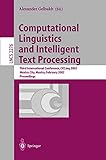Computational Linguistics and Intelligent Text Processing [electronic resource] : Third International Conference, CICLing 2002 Mexico City, Mexico, February 17–23, 2002 Proceedings / edited by Alexander Gelbukh.
Material type: TextSeries: Lecture Notes in Computer Science ; 2276Publisher: Berlin, Heidelberg : Springer Berlin Heidelberg, 2002Description: XIV, 450 p. online resourceContent type: text Media type: computer Carrier type: online resourceISBN: 9783540457152Subject(s): Computer science | Information storage and retrieval systems | Artificial intelligence | Translators (Computer programs) | Computer Science | Language Translation and Linguistics | Artificial Intelligence (incl. Robotics) | Mathematical Logic and Formal Languages | Information Storage and RetrievalAdditional physical formats: Printed edition:: No titleDDC classification: 006.35 LOC classification: P98-98.5Online resources: Click here to access online
TextSeries: Lecture Notes in Computer Science ; 2276Publisher: Berlin, Heidelberg : Springer Berlin Heidelberg, 2002Description: XIV, 450 p. online resourceContent type: text Media type: computer Carrier type: online resourceISBN: 9783540457152Subject(s): Computer science | Information storage and retrieval systems | Artificial intelligence | Translators (Computer programs) | Computer Science | Language Translation and Linguistics | Artificial Intelligence (incl. Robotics) | Mathematical Logic and Formal Languages | Information Storage and RetrievalAdditional physical formats: Printed edition:: No titleDDC classification: 006.35 LOC classification: P98-98.5Online resources: Click here to access online  E-BOOKS
E-BOOKS
| Current library | Home library | Call number | Materials specified | URL | Status | Date due | Barcode |
|---|---|---|---|---|---|---|---|
| IMSc Library | IMSc Library | Link to resource | Available | EBK5533 |
Computational Linguistics -- Multiword Expressions: A Pain in the Neck for NLP -- A Hypothesis on the Origin of the Sign Types -- Quantification and Intensionality in Situation Semantics -- Generalized Quantification in Situation Semantics -- Sign Language Translation via DRT and HPSG -- Multilayered Extended Semantic Networks as a Language for Meaning Representation in NLP Systems -- Constructing a Sensuous Judgment System Based on Conceptual Processing -- Towards a Natural Language Driven Automated Help Desk -- Lexical Tuning -- A Baseline Methodology for Word Sense Disambiguation -- An Adapted Lesk Algorithm for Word Sense Disambiguation Using WordNet -- Feature Selection Analysis for Maximum Entropy-Based WSD -- Combining Supervised-Unsupervised Methods for Word Sense Disambiguation -- A Proposal for WSD Using Semantic Similarity -- A New, Fully Automatic Version of Mitkov’s Knowledge-Poor Pronoun Resolution Method -- Pronominal Anaphora Generation in an English-Spanish MT Approach -- Using LSA for Pronominal Anaphora Resolution -- The Spanish Auxiliary Verb System in HPSG -- Surface Syntactic Relations in Spanish -- Parsing Ill-Formed Inputs with Constraint Graphs -- Part-of-Speech Tagging with Evolutionary Algorithms -- Formal Methods of Tokenization for Part-of-Speech Tagging -- Sepe: A POS Tagger for Spanish -- Fuzzy Set Tagging -- Towards a Standard for a Multilingual Lexical Entry: The EAGLES/ISLE Initiative -- Quantitative Comparison of Homonymy in Spanish EuroWordNet and Traditional Dictionaries -- Compilation of a Spanish Representative Corpus -- Aligning Multiword Terms Using a Hybrid Approach -- Automatic Selection of Defining Vocabulary in an Explanatory Dictionary -- Integrated Natural Language Generation with Schema-Tree Adjoining Grammars -- Experiments with a Bilingual Document Generation Environment -- A Computational Model of Change in Politeness with the Addition of Word Endings -- Tartar Morphology Implementation -- Automatic Generation of Pronunciation Lexicons for Spanish -- Intelligent Text Processing -- Diacritics Restoration: Learning from Letters versus Learning from Words -- A Comparative Study of Information Extraction Strategies -- Answer Extraction in Technical Domains -- Automatic Extraction of Non-standard Lexical Data for a Metalinguistic Information Database -- Text Segmentation for Efficient Information Retrieval -- Using Syntactic Dependency-Pairs Conflation to Improve Retrieval Performance in Spanish -- Multi-document Summarization Using Informative Words and Its Evaluation with a QA System -- Automated Selection of Interesting Medical Text Documents by the TEA Text Analyzer -- Chinese Documents Classification Based on N-Grams -- Cross-Lingual Document Similarity Calculation Using the Multilingual Thesaurus EUROVOC -- Empirical Formula for Testing Word Similarity and Its Application for Constructing a Word Frequency List -- AutoMarkup: A Tool for Automatically Marking up Text Documents -- Identification of Recurrent Patterns to Extract Definitory Contexts -- Specification Marks Method: Design and Implementation.


There are no comments on this title.